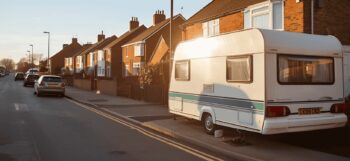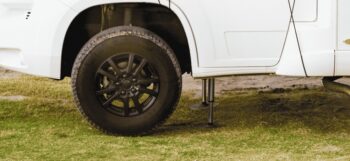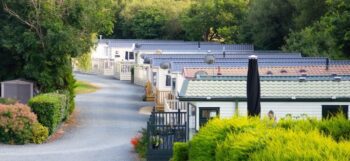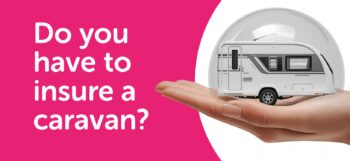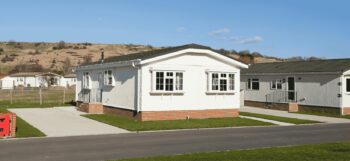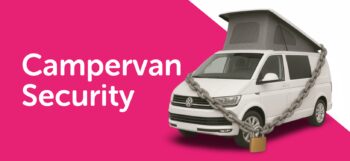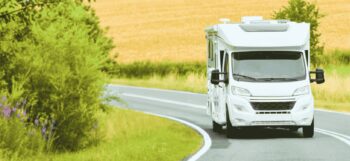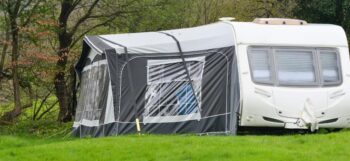Motorhome Essentials; where do you begin?
If you’ve recently bought a motorhome, you’re probably thinking about planning your first trip.
In this motorhome essentials guide, we look at some of the things you’ll need for your first trip and some optional extras you may want to add to your inventory later down the line.
We’ve broken these down into the following sections.
The essentials
Sat nav
The first thing on our motorhome essentials list is a motorhome-specific sat nav. This will allow you to programme in your vehicle's dimensions so that you use routes that avoid narrow lanes, low bridges, and other possible hazards.
If you’re relying on your phone for navigation, we recommend CoPilot.
This handy navigation app allows you to calculate your route according to the size and class of your outfit. Simply enter your motorhome or caravan dimensions and weight, and CoPilot Caravan will calculate an appropriate route, avoiding narrow or weight-restricted roads accordingly. It’s available for: IOS and Android and costs £25.99 per year
Levelling chocks/ramps
While most hardstanding pitches on campsites are fairly level, on the odd occasion, you may find yourself having to camp on a slight slope or incline, especially if you are parked on grass. Levelling ramps, or chocks as they are often referred to, are robust wedges that are placed under your wheels then driven or reversed onto, to level the nose or tail of your motorhome. They can make sleeping more comfortable, ensure more efficient running of your fridge and can also prevent your vehicle from rolling. Before you make a purchase, check they are suitable for the weight and size of your outfit.

Mud mats/grip mats
If you’re parked-up on a grass pitch, mud mats placed underneath your wheels during the winter months or long periods of wet weather can prevent you from getting stuck, if the field you’re pitched on becomes muddy. High on our list of motorhome essentials, having these to hand can you save the embarrassment of having to be towed out of a tricky situation.

240v electric cable
Motorhomes, and most professionally converted campervans, can be connected to electric hook-up (EHU) points on campsites to power electrical appliances. To connect to an EHU point, you’ll need an EHU cable. It’s advisable to buy one that’s 25 metres in length, as some campsites do not have hook-up points next to each pitch. In some cases, they can be up to 20m away from a pitch. It is also a good idea to buy a cable bag to keep the cable coiled and tidy, when not in use.

Dash cam
Installing a dash cam in your motorhome is good for a multitude of things including speed awareness, parking assistance, security, and improved driving. It can also be useful if you are involved in an accident, as you will have a recording of the incident.
Portable lighting
LED lanterns are a great light source as you won’t have to worry about flat batteries. A rechargeable torch or head torch will also come in handy if you need to find your way around a campsite after dark. The Lepro 3 Camping Lantern, with torches is great for camping as it can be both USB charged or battery operated, depending on your situation.

Portable water container
Most motorhomes are equipped with onboard water tanks – one for fresh water, the other for wastewater. However, if yours doesn’t have an onboard freshwater tank, you may require a portable water container. These come in a range of sizes, but it’s worth trying to calculate how much water you think you will use. This article from Climbingvan gives an estimated average weekly water consumption for the outlined tasks, to give you a better understanding of the tank you will need.

Thermal cab window blinds
Condensation occurs when warm air collides with cold surfaces, or when there is too much humidity in the air. When moisture-packed warm air meets a chilly surface, it quickly cools and releases water, which turns into condensation on the cold surface. As motorhomes are confined spaces, they are naturally prone to condensation.
Most condensation will form in the coldest parts of your motorhome such as the windows, roof, and walls, if not properly insulated. In cold temperatures, thermal blinds are on the list of motorhome essentials as they provide a layer of insulation to stop the heat within from pouring out through the glass windscreen and side windows. This massively reduces the condensation build up and humidity in your motorhome. Some larger, more luxurious RVs may already have them integrated.

Portable toilet
Many larger motorhomes may already have one, but if yours hasn’t got a toilet, this is another of our recommended motorhome essentials. Thetford portable cassette toilets are a popular brand that come in a variety of sizes. Small ones such as the Thetford Porta Potti Qube 335 are easy to tuck away. For larger models, you’ll need to think carefully about where you will store it when not in use.

Hosepipe and fittings
This is useful to have for filling up your water tank and washing muddy boots and dogs. A hosepipe made from food-grade material is the best option, and it should measure at least 15 metres in length.
Selection of bungee cords
Bungee cords are a must as they are good for securing things in place when you’re on the move, to stop annoying rattles and breakages. We recommend picking up a few in various sizes.
Gas
In most cases, a 6Kg gas bottle will be sufficient for a two to three week stay on a campsite with EHU, although most motorhomes can take up to 11kg. Propane gas is better for fuelling a larger number of appliances at the same time and can be used in sub-zero temperatures, whereas butane begins to produce less gas at temperatures below 4°C.
Refillable LPG bottles
A refillable LPG bottle is slightly more expensive but should definitely be added to your list of motorhome essentials for those who regularly enjoy off-grid wild camping or touring around Europe.
Leisure battery
For motorhoming without EHU you’ll need a leisure battery to power most of your 12V appliances. If you're just running a fridge or using built in lighting, a fully charged 100Ah battery will probably last about a week. If you watch TV or spend a few hours on your laptop, then a 100Ah battery should get you through three or four days. Installing solar panels can help to keep your leisure battery topped up, while you’re off grid.
Basic tool kit
Having a basic tool kit could come in useful if there's a mechanical issue with the engine, or for fixing something within the motorhome. This should include:

Spare bulbs and fuses
Keeping spare bulbs and fuses in your motorhome will ensure you’re well prepared if something blows. While it’s not mandatory to carry them, if you venture over to France and are stopped by French traffic police because one of your bulbs is out, they may insist that you change the bulb there and then.
Motorhome insurance and breakdown cover
Get yourself covered with a motorhome insurance policy that meets your requirements. While it may seem like a good idea to take out a policy with the lowest premium, you should feel confident that it won’t fall short should the worst happen. At Lifesure we work with a panel of A-rated insurers such as AXA, KGM, LV and Ageas, to provide feature-packed polices to keep our customers well protected while on the road. Our customers can enhance their policy by adding optional extras such as key cover, vehicle excess protection, accidental death & personal accident cover, substitute vehicle and legal expenses cover and RAC Motorhome breakdown cover.

Kitchen essentials
Collapsible kitchen equipment
Kitchen equipment can take up lots of space, which motorhomes often lack. Foldable or collapsible items such as pans, pots, colanders, graters, kettles, buckets and washing up bowls, to name but a few, are great for keeping storage cupboards clutter free.

Plastic glassware
Avoid the risk of smashed glasses by investing in some plastic glassware. Plastic glassware is available in many styles, such as pint glasses, wine glasses and tumblers. We highly recommend these portable travel wine glasses from Van-X, for that bit of luxury, without the risk of breakages.
Melamine crockery
Melamine is a reusable, lightweight and durable material, which makes melamine crockery another staple on the motorhome essentials list. It’s a great alternative to heavy and brittle dish products and utensils such as ceramic, glass or enamel, which need to be well protected while travelling.
Motorhome safety equipment
Motorhome fires are rare, but when they do happen the damage is often severe, leading to an insurance write off and potential harm to inhabitants. Consider fitting a smoke alarm for early fire detection, in addition to carrying a fire blanket and/or fire extinguisher. Carbon monoxide poisoning is something that should not be overlooked and can be prevented by the installation of a carbon monoxide detector. Regular maintenance of gas appliances can also reduce the risk.
It’s advisable to carry a basic first aid kit in case of medical emergencies. While this not a legal requirement in the UK, it is compulsory to carry one in European countries such as France, along with a warning triangle and high vis jackets.
Optional extras
Now we’ve looked at what we believe are high priority motorhome essentials, let’s look at some other things you may want to consider:
Awning
Awnings are great for providing additional living space and a good area to hang wet jackets and shoes during the winter months or periods of wet weather. They are also good for providing a shaded area to sit in outside of your motorhome in the summer. Some motorhomes come fitted with a wind out canopy, which can be wound out in minutes.
Portable outdoor shower
If your motorhome has showering facilities, you can skip this one. However, if you need one, a portable shower can be low-cost and lightweight, taking up very little space. If you need some privacy, consider purchasing a pop-up shower tent as well.
Door mat
Ideal for stopping you from dragging the outdoors, indoors, especially in wet weather.
Reverse camera
A great aid for seeing what’s behind you when reversing or parking.
Solar panel
Good for keeping your leisure battery fully charged throughout your trip, especially if you don’t have access to EHU.
Portable BBQ
Portable BBQs are ideal for outdoor cooking. Some campsites don’t permit BBQs, so it’s always advisable to check campsite rules. Ensure you have water to extinguish, if required.
Motorhome Wi-Fi
If you simply can’t live without internet access, you can stay connected with a portable Wi-Fi system. It also means you won’t rack up a massive data bill on your mobile devices.
Collapsible outdoor chairs
When it comes to camping luxuries, you can’t beat a camping chair. Whether it’s to sit outside your unit and watch the world go by, or to rest weary legs after a day’s hiking, you can’t put a price on having a comfortable place to sit.
Outdoor carpet for awning
One of the downsides of outdoor living is that you can sometimes find yourself sitting in mud or dirt. A good quality awning carpet can make your awning feel more homely. Breathable carpets allow air to circulate, which prevents the grass underneath from being killed and allows resting rainwater to drain off.
We hope you’ve found our motorhome essentials guide handy.
Don’t forget, we can provide feature packed motorhome insurance with premium prices starting from just £165 per year,* and RAC motorhome breakdown cover for travel in the UK, with the option to upgrade to European cover!
For further information, visit https://www.lifesure.co.uk/personal-insurance/motorhome-insurance or speak to one of our friendly, trained advisors on 01480 402 460.
*Based on insurer minimum premiums.


